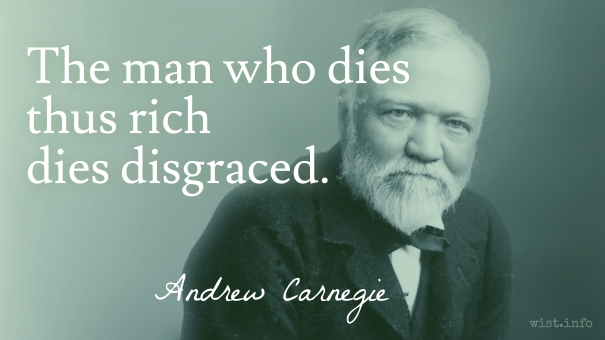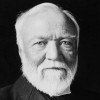“But whom do I treat unjustly,” you say, “by keeping what is my own?” Tell me, what is your own? What did you bring into this life? From where did you receive it? It is as if someone were to take the first seat in the theater, then bar everyone else from attending, so that one person alone enjoys what is offered for the benefit of all in common — this is what the rich do. They seize common goods before others have the opportunity, then claim them as their own by right of preemption. For if we all took only what was necessary to satisfy our own needs, giving the rest to those who lack, no one would be rich, no one would be poor, and no one would be in need.
[Καὶ ποῖον, λέγει, ἀδικῶ, μὲ τὸ νὰ κρατῶ γιὰ τoν ἐαυτόν μου αὐτὰ ποῦ μου ἀνήκουν; Ποία, εἰπέ μου, εἶναι αὐτὰ ποῦ σου ἀνήκουν; Ἀπὸ ποῦ τὰ ἔλαβες, καὶ τὰ ἔφερες στὴν ζωὴν αὐτήν; Ὅπως ἀκριβῶς κάποιος ποὺ εὑρίσκει στὸ θέατρο θέση μὲ καλὴν θέαν, ἐμποδίζει ἔπειτα τοὺς εἰσερχομένους, θεωρώντας ὡς ἰδικὸ τοῦ αὐτὸ ποὺ προορίζεται γιὰ χρῆσιν κοινήν, ἔτσι εἶναι καὶ οἱ πλούσιοι. Ἀφοῦ ἐκυρίευσαν ἐκ τῶν προτέρων τα κοινὰ ἀγαθά, τὰ ἰδιοποιοῦνται ἁπλῶς ἐπειδὴ τὰ ἐπρόλαβαν. Ἐὰν ὁ καθένας ἐκρατοῦσε ἐκεῖνο ποὺ ἀρκεῖ γιὰ τὴν ἱκανοποίηση τῶν ἀναγκῶν του, καὶ ἄφηνε τὸ περίσσευμα σ’ αὐτὸν ποὺ τὸ χρειάζεται, κανεὶς δὲν θὰ ἦταν πλούσιος, ἀλλὰ καὶ κανεὶς πτωχός.]
Basil of Caesarea (AD 330-378) Christian bishop, theologian, monasticist, Doctor of the Church [Saint Basil the Great, Ἅγιος Βασίλειος ὁ Μέγας]
“I Will Tear Down My Barns [καθελῶ μου τὰς ἀποθήκας],” Sermon # 6 [tr. Schroeder (2009)]
(Source)
In C. Paul Schroeder, ed., Saint Basil on Social Justice (2009).
Quotations about:
property
Note not all quotations have been tagged, so Search may find additional quotes on this topic.
How far, O rich, do you extend your senseless avarice? Do you intend to be the sole inhabitants of the earth? Why do you drive out the fellow sharers of nature, and claim it all for yourselves? The earth was made for all, rich and poor, in common. Why do you rich claim it as your exclusive right? The soil was given to the rich and poor in common — wherefore, oh, ye rich, do you unjustly claim it for yourselves alone? Nature gave all things in common for the use of all; usurpation created private rights. Property hath no rights. The earth is the Lord’s, and we are his offspring. The pagans hold earth as property. They do blaspheme God.
Ambrose of Milan (339-397) Roman theologian, statesman, Christian prelate, saint, Doctor of the Church [Aurelius Ambrosius]
(Attributed)
Frequently quoted in the early 20th Century in various social justice writings, and in the years since then, but all citations I can find fall back to its inclusion in Upton Sinclair, The Cry for Justice, Book 8 "The Church" (1915) (though it can be found somewhat earlier than that).
For a possession which is not diminished by being shared with others, if it is possessed and not shared, is not yet possessed as it ought to be possessed.
[Omnis enim res quae dando non deficit, dum habetur et non datur, nondum habetur quomodo habenda est.]
Augustine of Hippo (354-430) Christian church father, philosopher, saint [b. Aurelius Augustinus]
On Christian Doctrine [De Doctrina Christiana], Book 1, ch. 1 / § 1 (1.1.1) (AD 397) [tr. Shaw (1858)]
(Source)
(Source (Latin)). Alternate translations:
Everything which does not decrease on being given away is not properly owned when it is owned and not given.
[tr. Robertson (1958)]
For everything which does not give out when given away is not yet possessed in the way in which it should be possessed, while it is possessed and not given away.
[tr. Green (1995)]
For if a thing is not diminished by being shared with others, it is not rightly owned if it is only owned and not shared.
[Example]
Good fences make good neighbors.
Robert Frost (1874-1963) American poet
“Mending Wall” (1914)
(Source)
The narrator's neighbor speaking. The phrase predates Frost (and has analogs in many languages and cultures), but achieved additional currency by his use.
But justice commands us to have mercy upon all men, to consult the interests of the whole human race, to give to every one his due, and injure no sacred, public, or foreign rights, and to forbear touching what does not belong to us.
[Iustitia autem praecipit parcere omnibus, consulere generi hominum, suum cuique reddere, sacra, publica, aliena non tangere.]
Marcus Tullius Cicero (106-43 BC) Roman orator, statesman, philosopher
De Re Publica [On the Republic, On the Commonwealth], Book 3, ch. 15 / sec. 24 (3.24) [Philus] (54-51 BC) [tr. Yonge (1853), ch. 12]
(Source)
Contrasting the dictates of justice, vs the wisdom/prudence of conquest. Earlier sources arrange the fragments to make this ch. 12, as noted. (Source (Latin)). Alternate translations:
But justice orders us to spare all, to consult the welfare of mankind, to give to every one his own, and to abstain from every thing that is sacred, every thing that is public, every thing which is not our own.
[tr. Featherstonhaugh (1829), ch. 12]
But justice commands us to have mercy upon all men, to consult the interests of the whole human race, to give to every one his due, and injure no sacred, public, or foreign rights, and to forbear touching what does not belong to us.
[tr. Barham (1841), ch. 12]
Justice, on the other hand, instructs us to spare all men, to consider the interests of the whole human race, to give everyone his due, and not to touch the sacred or public property, or that which belongs to others.
[tr. Keyes (1928)]
Justice, on the other hand, teaches you to spare all men, to consider the interests of the human race, to render to each his own, and not to tamper with that which is sacred, that which is public, and that which belongs to another. [tr. Sabine/Smith (1929)]
Justice, on the other hand, teaches us to spare all men, take thought for the interests of mankind, give everyone his due, and not lay hands on the things belonging to the gods, the state, or somebody else.
[tr. Rudd (1998)]
Justice instructs us to spare everyone, to look after the interests of the human race, to render to each his own, to keep hands off things that are sacred or public or belong to someone else.
[tr. Zetzel (1999), ch. 24b]
But justice instructs [us] to spare everyone, to take care of the human race, to render to each his own, not to touch sacred things, public things, another's things.
[tr. Fott (2014)]
Who, pray, are benefiting by all this waste and confusion? The dew, a mere small percentage of the population of the world. All the remainder submit, because they think “it always has been so and it must always be so.” The work of those who have a conception of a true society of the future, must devote all their efforts towards disabusing the people’s minds of the ancient false hoods. It can be done. Many other hoary lies have passed away, so will this one, too.
Lucy Parsons (1851-1942) American labor organizer, anarchist, orator [a.k.a. Lucy Gonzalez]
“Property Rights vs. Human Rights,” The Liberator (22 Nov 1905)
(Source)
Dignity of character ought to be graced by a house; but from a house it is not wholly derived. A master is not to be honored by a house; but a house by its master.
[Ornanda enim est dignitas domo, non ex domo tota quaerenda, nec domo dominus, sed domino domus honestanda est.]
Marcus Tullius Cicero (106-43 BC) Roman orator, statesman, philosopher
De Officiis [On Duties; On Moral Duty; The Offices], Book 1, ch. 39 (1.39) / sec. 139 (44 BC) [tr. McCartney (1798)]
(Source)
(Source (Latin)). Alternate translations:
It is well if a man can enhance that credit and reputation he has gotten by the splendour of his house; but he must not depend on his house alone for it; for the master ought to bring honour to his fine seat, and not the fine seat bring honour to its master.
[tr. Cockman (1699)]
For dignity should be adorned by a palace, but not be wholly sought from it: -- the house ought to be ennobled by the master, and not the master by the house.
[tr. Edmonds (1865)]
In truth, high standing in the community should be adorned by a house, not sought wholly from a house; nor should the owner be honored by the house, but the house by the owner.
[tr. Peabody (1883)]
The house should not constitute, though it may enhance, the dignity of the master; let the master honour the house, not the house the master.
[tr. Gardiner (1899)]
Your house may add lustre to your dignity, but it will not suffice that you should derive all your dignity from your house: the master should ennoble the house, not the house the master.
[ed. Harbottle (1906)]
The truth is, a man's dignity may be enhanced by the house he lives in, but not wholly secured by it; the owner should bring honour to his house, not the house to its owner.
[tr. Miller (1913)]
A house may enhance a man's dignity, but it should not be the only source of dignity; the house should not glorify its owner, but he should enhance it.
[tr. Edinger (1974)]
The divorce between the church and the state ought to be absolute. It ought to be so absolute that no church property anywhere in any State or in the nation should be exempt from equal taxation; for if you exempt the property of any church organization, to that extent you impose a church tax upon the whole community.
James A. Garfield (1831-1881) US President (1881), lawyer, lay preacher, educator
Debate, House Appropriations Committee (22 Jun 1874)
(Source)
In the Congressional Record, 2(6):538 (1874).
As long as our civilization is essentially one of property, of fences, of exclusiveness, it will be mocked by delusions. Our riches will leave us sick; there will be bitterness in our laughter; and our wine will burn our mouth. Only that good profits which we can taste with all doors open, and which serves all men.
Ralph Waldo Emerson (1803-1882) American essayist, lecturer, poet
“Napoleon; or, The Man of the World,” Representative Men, Lecture 6 (1850)
(Source)
The poorest man may in his cottage bid defiance to all the forces of the Crown. It may be frail — its roof may shake — the wind may blow through it — the storm may enter — the rain may enter — but the King of England cannot enter! — all his force dares not cross the threshold of the ruined tenement!
William Pitt the Elder (1708-1778) British statesman, orator [1st Earl of Chatham]
Speech on the Excise Bill, House of Commons (Mar 1763)
(Source)
It is not private ownership, but private ownership divorced from work, which is corrupting to the principle of industry; and the idea of some socialists that private property in land or capital is necessarily mischievous is a piece of scholastic pedantry as absurd as that of those conservatives who would invest all property with some kind of mysterious sanctity.
R. H. Tawney (1880-1962) English writer, economist, historian, social critic [Richard Henry Tawney]
The Acquisitive Century, ch. 5 “The Functional Society” (1920)
(Source)
That conception is written large over the history of the nineteenth century, both in England and in America. The doctrine which it inherited was that property was held by an absolute right on an individual basis, and to this fundamental it added another, which can be traced in principle far back into history, but which grew to its full stature only after the rise of capitalist industry, that societies act both unfairly and unwisely when they limit opportunities of economic enterprise. Hence every attempt to impose obligations as a condition of the tenure of property or of the exercise of economic activity has been met by uncompromising resistance. The story of the struggle between humanitarian sentiment and the theory of property transmitted from the eighteenth century is familiar. No one has forgotten the opposition offered in the name of the rights of property to factory legislation, to housing reform, to interference with the adulteration of goods, even to the compulsory sanitation of private houses. “May I not do what I like with my own?” was the answer to the proposal to require a minimum standard of safety and sanitation from the owners of mills and houses.
R. H. Tawney (1880-1962) English writer, economist, historian, social critic [Richard Henry Tawney]
The Acquisitive Century, ch. 3 “The Acquisitive Society” (1920)
(Source)
Revolutions, as a long and bitter experience reveals, are apt to take their colour from the régime which they overthrow. Is it any wonder that the creed which affirms the absolute rights of property should sometimes be met with a counter-affirmation of the absolute rights of labour, less anti-social, indeed, and inhuman, but almost as dogmatic, almost as intolerant and thoughtless as itself.
R. H. Tawney (1880-1962) English writer, economist, historian, social critic [Richard Henry Tawney]
The Acquisitive Century, ch. 3 “The Acquisitive Society” (1920)
(Source)
Books constitute capital. A library book lasts as long as a house, for hundreds of years. It is not, then, an article of mere consumption but fairly of capital. and often in the case of professional men, setting out in life, it is their only capital.
Thomas Jefferson (1743-1826) American political philosopher, polymath, statesman, US President (1801-09)
Letter to James Madison (16 Sep 1821)
(Source)
The doctor asserted, “Sure religion is a fine influence — got to have it to keep the lower classes in order — fact, it’s the only thing that appeals to a lot of these fellows and makes ’em respect the rights of property. And I guess this theology is O.K.; lot of wise old coots figured it out, and they knew more about it than we do.” He believed in the Christian religion, and never thought about it; he believed in the church, and seldom went near it; he was shocked by Carol’s lack of faith, and wasn’t quite sure what was the nature of the faith that she lacked.
Privilege should not be tolerated because it is to the advantage of a minority; nor yet because it is to the advantage of a majority. No doctrinaire theories of vested rights or freedom of contract can stand in the way of our cutting out abuses from the body politic.
Theodore Roosevelt (1858-1919) American politician, statesman, conservationist, writer, US President (1901-1909)
“Biological Analogies in History,” Romanes Lecture, Oxford University (7 Jun 1910)
(Source)
The Bill of Rights was designed trustfully to prohibit forever two of the favorite crimes of all known governments: the seizure of private property without adequate compensation and the invasion of the citizen’s liberty without justifiable cause and due process.
The Stately Homes of England,
How beautiful they stand,
To prove the upper classes
Have still the upper hand.Noël Coward (1899-1973) English playwright, actor, wit
“The Stately Homes of England” (1938)
Satire on Felicia Hemens, "The Homes of England" (1849).
If the reactionary man, who thinks of nothing but the rights of property, could have his way, he would bring about a revolution; and one of my chief fears in connection with progress comes because I do not want to see our people, for lack of proper leadership, compelled to follow men whose intentions are excellent, but whose eyes are a little too wild to make it really safe to trust them.
Theodore Roosevelt (1858-1919) American politician, statesman, conservationist, writer, US President (1901-1909)
“The New Nationalism,” speech, Osawatomie, Kansas (31 Aug 1910)
(Source)
Those two fatal words, Mine and Thine.
Miguel de Cervantes (1547-1616) Spanish novelist
Don Quixote, Part 1, Book 2, ch. 11 (1605) [tr. Motteux & Ozell (1743)]
(Source)
Alt trans.:
- "Oh happy age, which our first parents called the age of gold! not because gold, so much adored in this iron-age, was then easily purchased, but because those two fatal words, mine and thine, were distinctions unknown to the people of those fortunate times." [Full version of the above]
- "Happy the age, happy the time, to which the ancients gave the name of golden, not because in that fortunate age the gold so coveted in this our iron one was gained without toil, but because they that lived in it knew not the two words 'mine' and 'thine'!" [tr. Ormsby (1885)]
- "Happy age, and happy days were those, to which the ancients gave the name of golden; not, that gold, which in these our iron-times, is so much esteemed, was to be acquired without trouble, in that fortunate period; but, because people then, were ignorant of those two words MINE and THINE." [tr. Smollett (1976), as Part 1, Book 1, ch. 3]
I am a marvelous housekeeper. Every time I leave a man, I keep his house.
Zsa Zsa Gabor (1917-2016) Hungarian-American actress, socialite [b. Sári Gábor]
How to Catch a Man, Keep a Man, and Get Rid of a Man (1970)
(Source)
When actually given a citation, this quote is attributed to this book by Gabor, though I have been unable to find a fully visible copy of the book online to confirm. Two other attributions of similar sentiments to Gabor:
He taught me housekeeping; when I divorce I keep the house.
]In Ned Sherrin, Cutting Edge (1984), regarding her fifth husband, George Sanders.]
I'm a wonderful housekeeper. Every time I get a divorce, I keep the house.
[In Sam Staggs, Finding Zsa-Zsa (2019)]






















